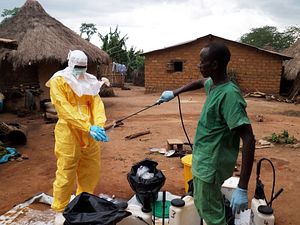A Chinese pharmaceutical company working with Academy of Military Medical Sciences (AMMS), a PLA-affiliated research institution, claims to have developed an experimental cure for the Ebola virus. An outbreak of the deadly virus in west Africa has become a global health crisis. According to the World Health Organization, as of October 12 there had been 8,997 “confirmed, probable, and suspected cases” of Eboal and 4493 deaths in Guinea, Liberia, Nigeria, Senegal, Sierra Leone, Spain, and the United States. U.S. and Japanese firms also have experimental drugs that aim to cure Ebola, but this is the first drug developed by Chinese researchers.
Reuters reports that AMMS developed the experimental cure for Ebola, a drug known as JK-05. AMMS has partnered with Sihuan Pharmaceutical Holdings Group Ltd. to make JK-05 available on the market (it is currently only approved for emergency military use). Reuters reports that Sihuan’s chairman, Che Fengsheng, told investors that the company can file for approval with the Chinese Food and Drug Administration by the end of 2014. “They are looking at this very seriously … and we could get on the ‘green light’ track,” he said. Che noted that Sihuan’s close ties to the Chinese military would help speed up the approval process. Sihuan was originally a military scientific unit before being set up as a company in 2001.
According to Sihuan management, the drug has been in development for five years and has been effective in animal tests conducted on mice. As of yet, there have been no clinical trials of JK-05; the company plans to test the drug out first on Chinese nationals who have contracted the disease in Africa. Tests on African nationals would require international approval.
The development of a cure would be a major victory in the global fight against Ebola. China has been active in sending both aid and medical workers to affected African countries. For Beijing, a swift and proactive response to the Ebola crisis is an extension of China’s friendly relationship with African countries – and helps fight the oft-heard accusations that China is acting as a “neo-colonialist” power on the continent.
Medical cooperation has long been a part of China-Africa relations. China began sending medical teams to Africa in the early 1960s; as of 2013, China had medical teams in 42 African countries, accounting for most of the 1,200 Chinese medical personnel stationed in developing countries. These teams are responsible for treating African patients as well as training African doctors – and, of course, providing medicines.
Medical cooperation hasn’t been all smooth sailing, however. In recent years, Chinese companies have been accused of dumping counterfeit drugs in African markets, resulting in billions of dollars and countless lives lost because of fake medications. Critics blame lax regulations in China for the problem while Chinese officials say African smugglers and counterfeiters are largely behind the sale of fake drugs. Still, there is at least some concern in China that the scandal will damage the goodwill built up in Africa through decades of medical exchanges.
Overall, however, Chinese medicines and medical treatments (including traditional medicine like acupuncture) remains a popular choice for many in Africa. An effective treatment for Ebola would only further solidify China’s role in providing medical aid on the African continent. It would also give a huge boost to the global reputation of China’s pharmaceutical industry, which has struggled to find a foothold in many developed countries.

































